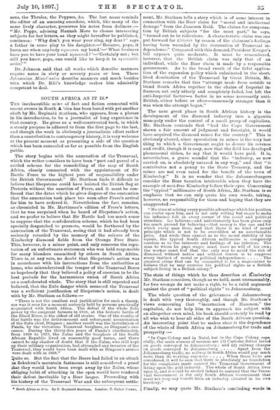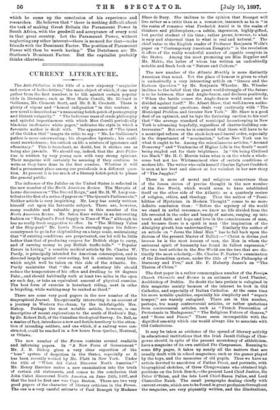SOUTH AFRICA AS IT IS.* THE inexhaustible mine of fact
and fiction connected with recent events in South A. rrica has been bored with yet another shaft by Mr. Reginald Statham, who appears, from a phrase in his introduction, to be a journalist of long experience in that country. He gives us a well-constructed book, in which a steady purpose is adhered to from the first page to the last, and though the work is obviously a journalistic effort rather than a contribution to contemporary history, it is very welcome at the present moment as presenting a side of the question which has been concealed as far as possible from the English public.
The story begins with the annexation of the Transvaal, which the writer considers to have been "part and parcel of a settled scheme for the remodelling of the map of South Africa, closely connected with the appointment of Sir Bartle Frere to the highest post of responsibility under the British Government." Mr. Statham finds it difficult to believe that Shepstone could have hoisted the British flag at Pretoria without the sanction of Frere, and it must be con- fessed that the dates which he gives dispose of the contention that the annexation took place too soon after Frere's arrival for him to have ordered it. Nevertheless the fact remains, as chronicled in Mr. Martineau's edition of Frere's letters, that he was surprised when he heard of Shepstooe's action, and we prefer to believe that Sir Bartle had too much sense to suppose that the confederation scheme, which he had been specially despatched to promote, would be furthered by the annexation of the Transvaal, seeing that it had already been seriously retarded by the memory of the seizure of the Kimberley diamond fields from the Orange Free State.
This, however, is a minor point, and only concerns the repu- tation of an unfortunate statesman who was held responsible for many blunders committed by others in South Africa. There is, at any rate, no doubt that Shepstone's action was in accordance with his instructions from the authorities at home, who misunderstood the temper of the Transvaal Boers so hopelessly that they believed a policy of coercion to be the best prelude for the harmonious union of South Africa as a confederated whole. The story that is still repeated and believed, that the Zulu danger which menaced the Transvaal was a sufficient justification of Shepstone's action, is dealt With by Mr. Statham as follows :—
" There is not the smallest real justification for such a theory, nor was it ever for a moment seriously held by persons practically acquainted with South Africa. The defeat of the whole Zulu power by the emigrant farmers in 1838, at the historic battle of the Bloed River, is the oldest of old stories. One of the results of that battle was the dethronement and subsequent assassination of the Zulu chief, Dingaan ; another result was the installation of Panda, by the victorious Transvaal burghers, as Dingaan's suc- cessor. During the thirty-five years of Panda's chieftainship, from 1838 to 1873, the Zulus and the burghers of the South African Republic lived on reasonably good terms, and there cannot be any shadow of doubt that if the Zulus, who still kept up their military organisation, had attempted any invasion of the Transvaal, they would have been dealt with as Dingaan's armies -vere dealt with in 1838."
Quite so. But the fact that the Boors had failed in an attack an Sekukuni's mountain fastnesses is still considered a proof that they would have been swept away by the Zulus, whose obliging habit of attacking in the open would have rendered their defeat inevitable by a Boer laager. Proceeding with his history of the Transvaal War and the subsequent settle-
• South Africa as it is. By F. Reginald Statham. London: T. Fisher Unwin. ment, Mr. Statham tells a story which is of some interest in connection with the Boer claim for "moral and intellectual damage" from the Jameson Raid. The claims for compensa- tion by British subjects "for the most part," he says, "turned out to be ridiculous. A characteristic claim was one put forward for £50,000 by reason of the claimant's feelings
having been wounded by the restoration of Transvaal in- dependence." Compared with this demand, President Kruger's bill appears quite moderate. It must be remembered, however, that the British claim was only that of an individual, while the Boer claim is made by a responsible government. As to the broad result of the fitful applica- tion of the expansion policy which culminated in the short- lived domination of the Transvaal by Great Britain, Mr. Statham remarks that this "attempt made from outside to blend South Africa together in the chains of Imperial in- fluences, not only utterly and completely failed, but left the anti-Imperial factor—a factor in no sense necessarily anti- British, either before or after—immensely stronger than it was when the attempt began."
The next great phase in South African history is the development of the diamond industry into a gigantic monopoly under the control of a small group of capitalists. Mr. Statham contends that "had the Cape Government shown a fair amount of judgment and foresight, it would have acquired the diamond mines for the country." This is obviously absurd, since speculation in mines is the very last thing to which a Government ought to devote its revenue and credit, though it is easy, now that the field has developed phenomenal riches, to say that it would have paid. It is, nevertheless, a grave scandal that the "industry, as now carried on, is absolutely untaxed in any way," and that "it contributes not a penny to the State Treasury, and the mines are not even rated for the benefit of the town of Kimberley." It is no wonder that the Johannesburgers consider the Boer taxation intolerable when they have the example of scot-free Kimberley before their eyes. Concerning the " typical " millionaire of South Africa, Mr. Statham is so emphatic that we can only quote his own words, taking, however, no responsibility for them and hoping that they are exaggerated :—
"He aims at seizing every possible advantage which his position can confer upon him, and is not only willing but eager to make his influence felt in every corner of the social and political structure, he believes—and unfortunately has been given only too much ground for believing—that money is the one end for which every man lives, and that there is no kind of moral principle which is not to be overridden at an ascertainable price. And while thus cynical as to the moral stability of his equals, the typical South African millionaire is completely careless as to the interests and feelings of his inferiors. The man to whom he pays wages must have no will of his own ; the worker must feel that the only way to avoid the risk of dismissal without notice and without reason is to suppress every instinct of moral or political independence The greatest- crime that can be committed is for a wage-earner to believe that he may exercise his political rights as a British subject living in a British colony."
The state of things which he thus describes at gimberley Mr. Statham considers, though as we hold, most unreasonably, for two wrongs do not make a right, to be a valid argument against the grant of "political rights" to Johannesburg.
The whole question of the grievances of Johannesburg is dealt with very thoroughly, and though Mr. Statham's views concerning that "incarnation of Mammon," the capitalist, do not help him to approach his subject with an altogether even mind, his book should certainly be read by all who wish to hear all sides of the South African question. An interesting point that he makes, clear is the dependence of the whole of South Africa on Johannesburg for trade and prosperity :—
"In Cape Colony and in Natal, but in the Cape Colony eve. cially, the main sources of revenue are (1) Customs duties levied on goods conveyed to Johannesburg ; and (2) railway charges
on goods conveyed to Johannesburg Apart .from the Johannesburg traffic, no railway in South Africa would pay much
more than its working expenses When these facts are considered, it will be seen that there is absolutely no foundation for the complaints made against the Transvaal Government of living upon the gold industry. The whole of South Africa lives upon it, and it would be absurd indeed to contend that the Trans- vaal Government is the only South African Government that must not reap any benefit from an industry situated in its own territory."
Finally, we may quote Mr. Statham's concluding words in which he sums up the conclusion of his experience and researches. He believes that "there is nothing difficult about the task of making Great Britain the Paramount Power in South Africa, with the goodwill and acceptance of every soul in that great country. Let the Paramount Power, without neglecting any other interest—there is no need for that—make friends with the Dominant Factor. The position of Paramount Power will then be worth having." The Dutchmen are Mr. Statham's Dominant Factor. But the capitalist probably thinks otherwise.



































 Previous page
Previous page